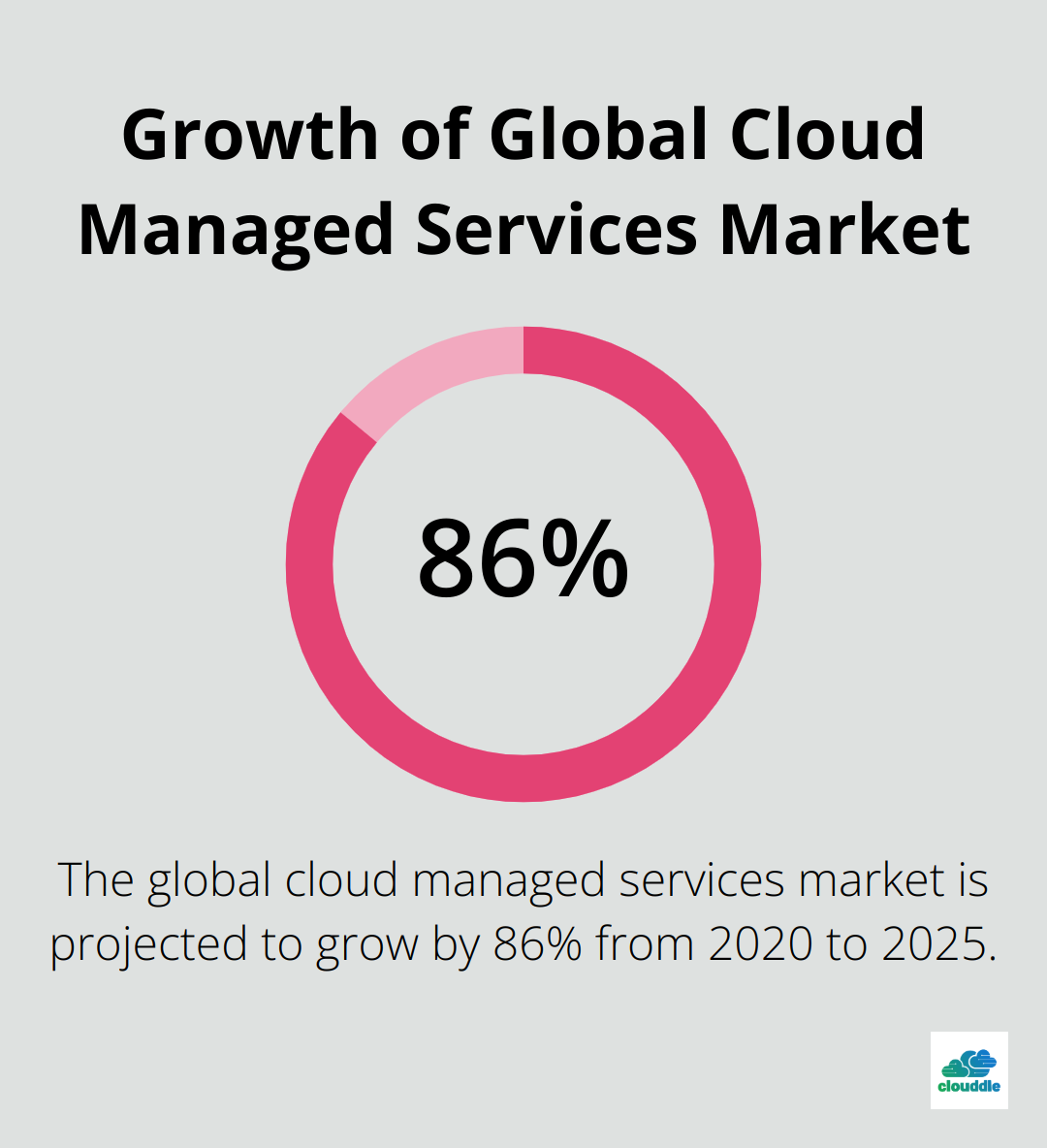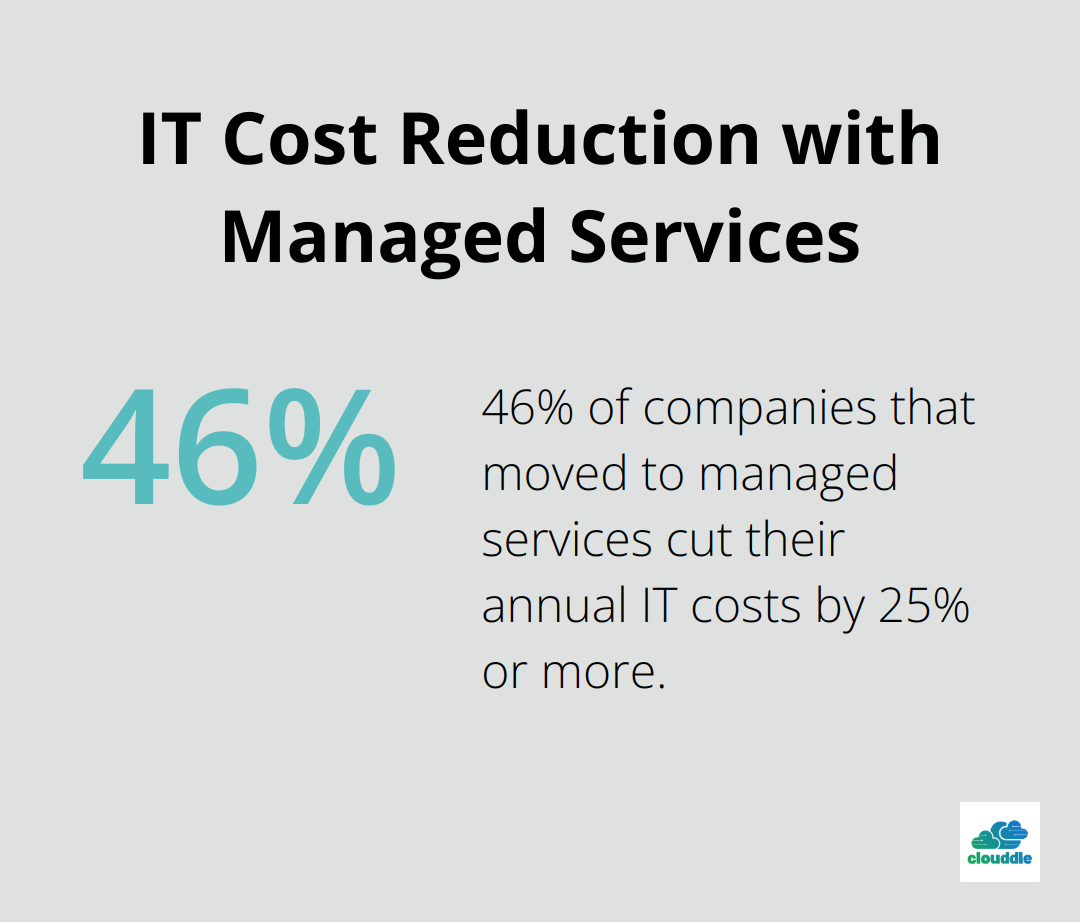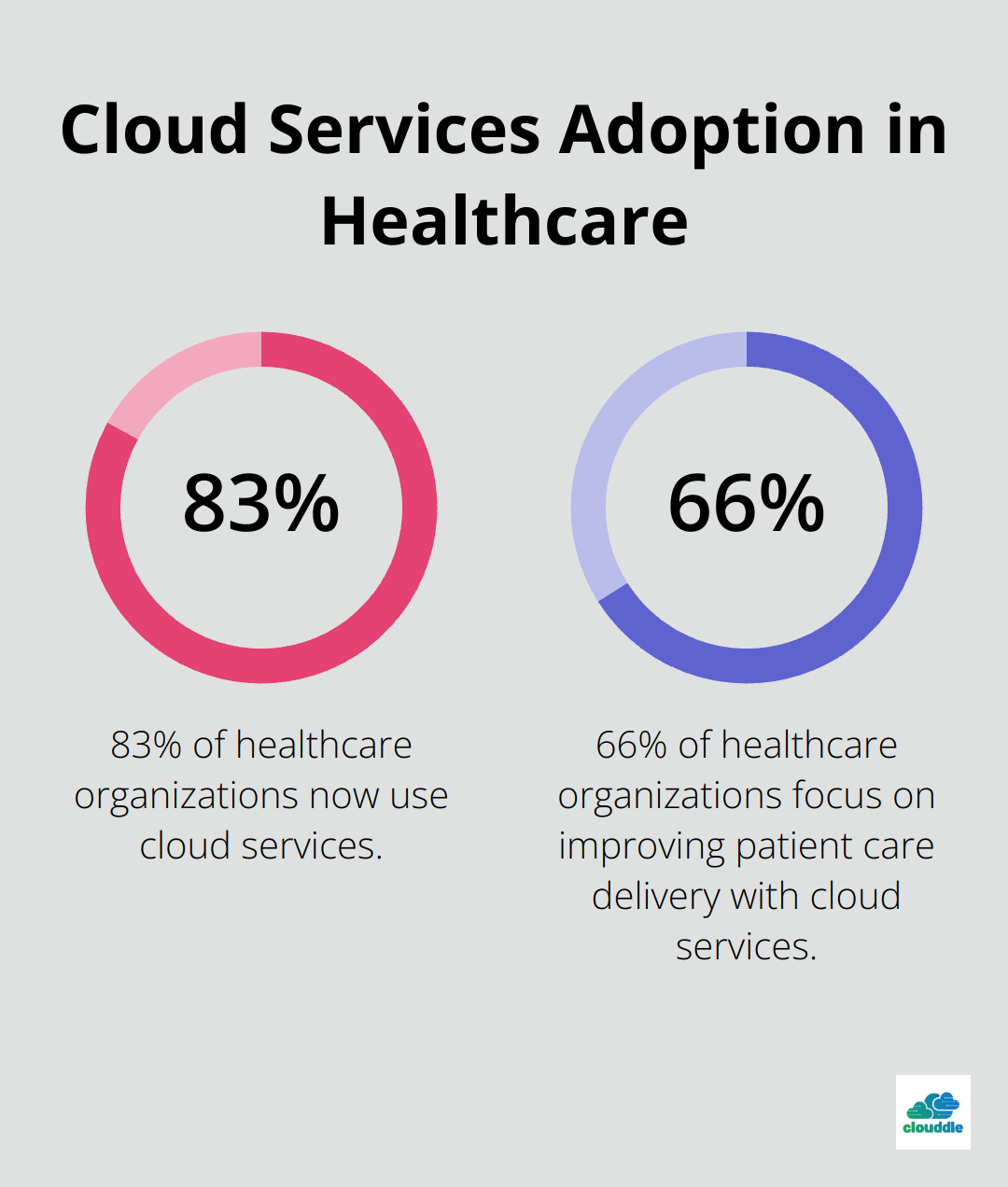Cloud managed IT services are revolutionizing how businesses handle their technology infrastructure. At Clouddle, we’ve seen firsthand how these services can transform operations, boost efficiency, and cut costs.
The shift from traditional IT management to cloud-based solutions is reshaping the business landscape. This blog post explores the key features, benefits, and industry applications of cloud managed IT services, offering insights into why they’re becoming the go-to choice for forward-thinking companies.
What Are Cloud Managed IT Services?
Defining Cloud Managed IT
Cloud computing enables organizations to access and store information without managing their own physical devices or IT infrastructure. These services outsource IT management to third-party providers who use cloud technology to deliver, monitor, and maintain IT systems remotely.
The core components of cloud managed IT services include:
- Remote monitoring of networks and systems
- Proactive maintenance to prevent issues
- Rapid response to IT problems
- Data backup and recovery
- Cybersecurity measures
- Software updates and patch management
A recent study by MarketsandMarkets projects the global cloud managed services market to grow from $62.4 billion in 2020 to $116.2 billion by 2025. This substantial growth highlights the increasing adoption of these services across various industries.

The Evolution of IT Management
The transition from traditional IT management to cloud-based solutions stems from the need for greater flexibility, scalability, and cost-efficiency. Previously, businesses relied heavily on on-premise IT infrastructure, which often required significant upfront investment and ongoing maintenance costs.
Cloud managed IT services have transformed this model. They enable businesses to access advanced IT capabilities without extensive in-house resources. This shift particularly benefits small and medium-sized enterprises (SMEs) that may lack the resources for a full-fledged IT department.
Tangible Benefits for Businesses
Cloud managed IT services offer numerous impactful advantages. A survey by Deloitte found that companies using managed services reported a 33% reduction in IT costs on average. This cost-saving aspect proves particularly crucial in today’s competitive business environment.
These services also provide enhanced security measures. With cyber threats becoming increasingly sophisticated, access to expert security professionals and advanced tools proves invaluable. Cybersecurity Ventures expects global cybercrime costs to grow by 15 percent per year over the next five years, reaching $10.5 trillion USD annually by 2025, underscoring the importance of robust security measures.
Scalability stands out as another key benefit. Cloud managed IT services allow businesses to easily adjust their IT resources based on their needs. This flexibility particularly benefits businesses with fluctuating demands or those experiencing rapid growth.
Lastly, these services free up internal resources, allowing businesses to focus on their core competencies. A study by CompTIA revealed that 46% of companies that moved to managed services cut their annual IT costs by 25% or more, enabling them to reallocate these resources to strategic initiatives.
The Future of Business Technology
As we explore the role of cloud managed IT services in shaping the future of business technology, their ability to provide cost-effective, scalable, and secure IT solutions becomes increasingly evident. In the next section, we’ll examine the key features that make these services an attractive option for businesses of all sizes looking to stay competitive in the digital age.
What Makes Cloud Managed IT Services Stand Out?
Cloud managed IT services have revolutionized how businesses handle their technology infrastructure. These services offer unique features that set them apart from traditional IT management approaches.
Round-the-Clock Monitoring and Management
One of the most significant advantages of cloud managed IT services is 24/7 monitoring and management. This constant vigilance allows for immediate detection and resolution of issues, often before they impact business operations. Modern MSPs can reduce IT management costs by up to 70% through consolidated vendor management services.
Automatic Updates and Maintenance
Cloud managed services providers handle software updates and system maintenance automatically. This feature ensures that businesses always have access to the latest technologies and security patches without the need for manual intervention.
Tailored Scalability
Cloud managed IT services offer unparalleled scalability. Businesses can easily adjust their IT resources based on current needs, whether scaling up during peak periods or scaling down during slower times. This flexibility proves particularly valuable for seasonal businesses or those experiencing rapid growth. Flexera’s 2023 State of the Cloud Report indicates that 59% of enterprises consider cloud scalability as a top priority.
Advanced Security Protocols
Security remains a paramount concern in today’s digital landscape. Cloud managed IT services typically include advanced security measures such as multi-factor authentication, encryption, and regular security audits. The 2023 Verizon Data Breach Investigations Report revealed that 95% of breaches could have been prevented with basic security measures, underscoring the importance of robust security protocols.
Cost-Effective IT Management
Perhaps one of the most attractive features of cloud managed IT services is their cost-effectiveness. Outsourcing IT management allows businesses to significantly reduce their IT expenditure. A survey by CompTIA found that 46% of companies that moved to managed services cut their annual IT costs by 25% or more. This reduction in costs allows businesses to allocate resources to other critical areas of operation.

As we explore the impact of cloud managed IT services across various industries, it becomes clear that these features provide significant advantages for businesses of all sizes. The next section will examine how specific sectors benefit from these innovative solutions.
How Industries Transform with Cloud Managed IT
Healthcare’s Digital Revolution
Cloud managed IT services transform healthcare by improving patient care and strengthening data security. Electronic Health Records (EHRs) stored in the cloud enable seamless information sharing between healthcare providers, resulting in more coordinated care and reduced medical diagnostic errors. HIMSS Analytics reports that 83% of healthcare organizations now use cloud services, with 66% focusing on improving patient care delivery.

Cloud-based telemedicine platforms have experienced a significant uptick in adoption due to their usability and safety in providing healthcare services during the COVID-19 pandemic.
Fintech’s Compliance and Security Boost
The finance sector leverages cloud managed IT to ensure compliance and enhance data protection. As regulations like GDPR and CCPA become more stringent, financial institutions turn to cloud services for assistance. An Accenture survey revealed that 60% of banks view cloud as essential for achieving their business priorities.
Cloud managed services enable fintech companies to scale rapidly and securely. Mobile payment platforms can now handle millions of transactions per second during peak times, thanks to the scalability of cloud infrastructure.
Retail’s Customer-Centric Transformation
In retail, cloud managed IT enhances customer experiences and optimizes inventory management. Retailers use cloud-based analytics to gain insights into customer behavior and preferences. Zebra Technologies reports that 87% of retailers will deploy mobile point-of-sale (mPOS) devices by 2026, enabled by cloud technology.
Cloud-based inventory management systems help retailers reduce stockouts and overstocking. IHL Group found that out-of-stocks cost retailers $984 billion annually. Cloud managed IT services mitigate this issue by providing real-time inventory data across all sales channels.
Manufacturing’s Operational Optimization
Cloud managed IT services revolutionize manufacturing by optimizing operations and supply chain management. These services enable real-time monitoring of production lines, predictive maintenance, and improved quality control. A study by McKinsey & Company found that manufacturers who adopted cloud-based solutions experienced a 20-30% increase in overall productivity.
The integration of Internet of Things (IoT) devices with cloud managed services allows manufacturers to collect and analyze vast amounts of data. This data-driven approach leads to more efficient resource allocation and reduced waste (key factors in today’s competitive manufacturing landscape).
Hospitality’s Guest Experience Enhancement
The hospitality industry benefits from cloud managed IT services by streamlining guest services and property management. Cloud-based property management systems allow hotels to manage reservations, check-ins, and guest preferences more efficiently. According to a report by Hospitality Technology, 54% of hotels plan to increase their IT budgets, with a focus on cloud-based solutions.
Cloud managed services also enable personalized guest experiences through data analytics. Hotels can now tailor their services based on guest preferences and behavior, leading to increased customer satisfaction and loyalty.
Final Thoughts
Cloud managed IT services have revolutionized business technology across industries. These services offer remote monitoring, proactive maintenance, enhanced security, and cost-effective solutions, allowing organizations to focus on their core competencies. The scalability and flexibility of cloud managed IT services enable businesses to adapt quickly to changing market conditions and technological advancements.
The future of cloud managed IT services will likely include further integration of artificial intelligence and machine learning. These technologies will enhance predictive maintenance capabilities, automate routine tasks, and provide deeper insights into business operations. Edge computing will also play a larger role, bringing processing power closer to data sources and reducing latency for time-sensitive applications.
Businesses ready to harness the power of cloud managed IT services should first assess their current IT infrastructure and identify areas for improvement. Clouddle offers tailored solutions for industries such as hospitality, multi-family dwelling, and senior living, combining networking, entertainment, and security services without upfront investment. As technology evolves, cloud managed IT services will continue to drive business success, improve operational efficiency, and deliver better customer experiences.


